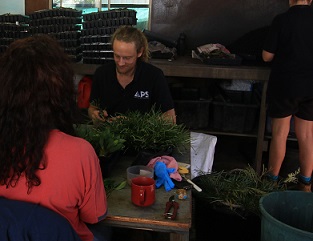Commercial horticulture offers more opportunities than most people realise. Often you don't need all that much to find work - just awareness of the opportunities, a good attitude, and a few key skills. A 20 hour course in the right skills may have more chance of kicking off a career, than a full blown diploma or degree that misses those key skills.
WHERE TO START?
Check out our mind map on commercial Horticulture and discover the huge variety of possibilities.
 Commercial horticulture covers those enterprises that buy and sell horticultural products or services. They are mostly private enterprise businesses, but may also include public enterprises that charge for goods or services provided.
Commercial horticulture covers those enterprises that buy and sell horticultural products or services. They are mostly private enterprise businesses, but may also include public enterprises that charge for goods or services provided.
There are many different ways of sub-dividing this industry; but in reality, the lines between the sectors are blurred and there can be a lot of overlap and variation in how you differentiate sectors, according to the context and perspective.
One way of dividing or classifying commercial horticulture work, is as:
- Crop Production -fruit, vegetables, cut flowers, potted plants
- Landscape Services - design, construction and maintenance of plants and turf
- Horticultural Products -tools, machinery, materials, plants
- Horticultural Services -consulting, activities, education, media
Some would consider Commercial Sector Horticulture as another division; dealing with horticulture in commercial places such as shopping centres, tourist marks and office buildings; however, the work here is very similar to what is found in the public sector; and sometimes in the private sector.
Commercial horticulture enterprises may alternatively be seen as mostly fitting into Farms (Orchards, Market Gardens, etc); Landscape Industries, Gardening Services, Nurseries, Turf, Arboriculture and Allied Trades. There are however some enterprises that may not fit neatly into any categorisation.

Over the past century in particular though, people have become more affluent, and with greater disposable income, opportunities to develop and own private gardens have strengthened. Gardening has emerged as a major pastime. Governments have seen the environmental, social and health benefits of horticulture.
Example:
There is great demand by garden centres for people who have plant knowledge. Such people may know about particular groups of plants or they may have a broader knowledge. Plant specialists can help customers to choose suitable plants as well as inform them about what to expect of plants they have decided to buy.
NEXT?
Take a short course in a critical area - we have several offered on this site - only 20 hrs; and not very costly
If you are not sure what course - ask us.
SEE https://www.acs.edu.au/advice/mindmap.aspx?id=ch